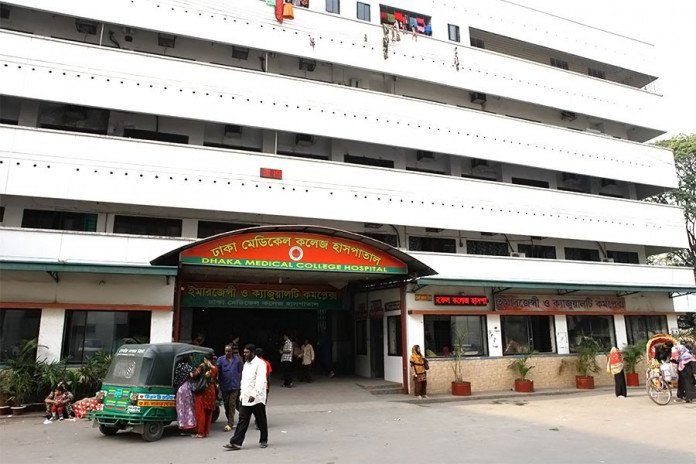Rise in COVID-19, Dengue cases
Most hospitals not prepared

Although the Directorate General of Health Services (DGHS) have started supplying COVID-19 test kits to hospitals across the country, most of the health facilities are yet to open dedicated wards for corona patients.
Corona infections as well as dengue cases have suddenly increased across the country, but most hospitals are not well prepared, raising concern among public health experts over the possibility of another health crisis.
Dengue is not a contagious disease. In the previous years, a number of public and private hospitals opened dedicated wards for treatment of dengue patients, but such initiative almost remains absent this year.
According to DGHS data, one person died of dengue on Saturday. In the last 24 hours 248 new dengue cases reported— 104 of them in Barishal alone. Since January 1, a total of 6,926 people have been infected with dengue across the country, with 30 deaths and 6,103 recoveries.
On the COVID-19 front, new corona sub-variant ‘Omicron’ claimed lives of seven people in recent days. On Wednesday, 28 new corona cases were identified through 359 tests at different hospitals across the country.
Bangladesh has so far reported 2,051,901 corona cases and 29,506 deaths since the corona pandemic began in March, 2020. The overall test positivity rate stands at 13.05 percent, with a daily rate of 9.09 percent as of the latest count.
Experts warn that the overlap of the monsoon-driven dengue with fresh COVID-19 transmission is alarming. Hospitals are witnessing rise in admission of patients with fever and respiratory problems, but many are facing shortage of test kits, vaccines, ICU facilities and even essential medical supplies like IV saline and platelet kits.
Brigadier General Asaduzzaman, Director of Dhaka Medical College Hospital, acknowledging the situation, said though testing has resumed with newly supplied kits, no dedicated COVID-19 ward has been opened at the hospital.
“We’ve dedicated a corner for suspected COVID-19 cases. If corona infections surge, we will keep our isolation ward ready exclusively for COVID patients,” he said. The hospital currently has a dedicated dengue ward.
Similarly, Mugda Medical College Hospital has received testing kits, but it is yet to open dedicate wards for either COVID-19 or dengue. Deputy Director Dr Nurul Islam said, “Admission of dengue patients is still low. If the situation worsens, we will open additional wards and beds. We’re also readying a separate ward for COVID-19 patients.”
Shaheed Suhrawardy Medical College and Hospital also lacks a dedicated COVID-19 ward. Director Dr Shafiqul Islam of the hospital said, “We haven’t received any COVID patients yet, but we are equipped with test kits. If the situation worsens, we will take necessary steps, including setting up dedicated wards.”
Sir Salimullah Medical College Mitford Hospital in Old Dhaka is witnessing crowd of corona and dengue patients every day and the hospital is facing difficulty in distinguishing between dengue, COVID-19, and influenza cases, sources said.
A patient named Saiful Islam told the Bangladesh Post that he was admitted to the hospital with fever. “I was first tested for dengue and (tested negative) and later I was advised to undergo a COVID-19 test.
At Kurmitola General Hospital, a dengue corner has been set up, but there are no dedicated arrangements for COVID-19 patients. A doctor requesting anonymity said, “We served with full capacity during the previous COVID wave, but currently we lack technical readiness. The DGHS has assured us that supplies will be provided shortly.”
Dr Md Sayedur Rahman, Special Assistant to the Minister of Health, said the government has launched RT-PCR testing at 17 centres nationwide. “Sufficient test kits have been supplied, and VTM kits sent to districts to facilitate sample collection,” he said.
With Barisal Division, particularly Barguna district, reporting a surge in dengue admissions, the area has been declared a hotspot. Overcrowded hospital wards in Barguna Sadar Hospital now house more patients than available beds.
Health experts warn that the COVID-19 virus, which caused a global pandemic five years ago, is reemerging in new forms. According to the International Centre for Diarrhoeal Disease Research, Bangladesh (icddr,b), new subvariants XFG and XFC were detected in April and are responsible for the recent uptick in cases. The JN.1 variant has already been found in multiple districts, though icddr,b states there’s no cause for panic yet.
Meanwhile, DGHS Director General Prof Dr Md Abu Jafor said the health authority is on high alert. “We were already concerned about dengue, but the rise in COVID-19 cases requires us to act on both fronts. We’ve issued directives to hospitals and are closely monitoring infection rates. Public awareness is critical. Mask-wearing in public gatherings and immediate testing in case of fever is essential.”
Prof Dr Faruq Ahmed, Head of Medicine at Dhaka Medical College, said that public compliance with health guidelines remains low. “We cannot predict how the situation will evolve. People must take personal responsibility—keep surroundings clean, avoid water stagnation to prevent Aedes mosquito breeding, and follow hygiene protocols.”
“Maintaining social distance, washing hands frequently with soap, and wearing a mask—especially when going outside—are essential to protect ourselves from corona infection,” he added.
Dr Halimur Rashid, Line Director of the Communicable Disease Control (CDC) wing at DGHS, said that major hospitals in Dhaka and key regional medical colleges, including Rajshahi, Barisal, Khulna, Cumilla, and Rangpur, have received new batches of test kits. In addition, all hospitals have been instructed to keep everything ready for Covid treatment.



